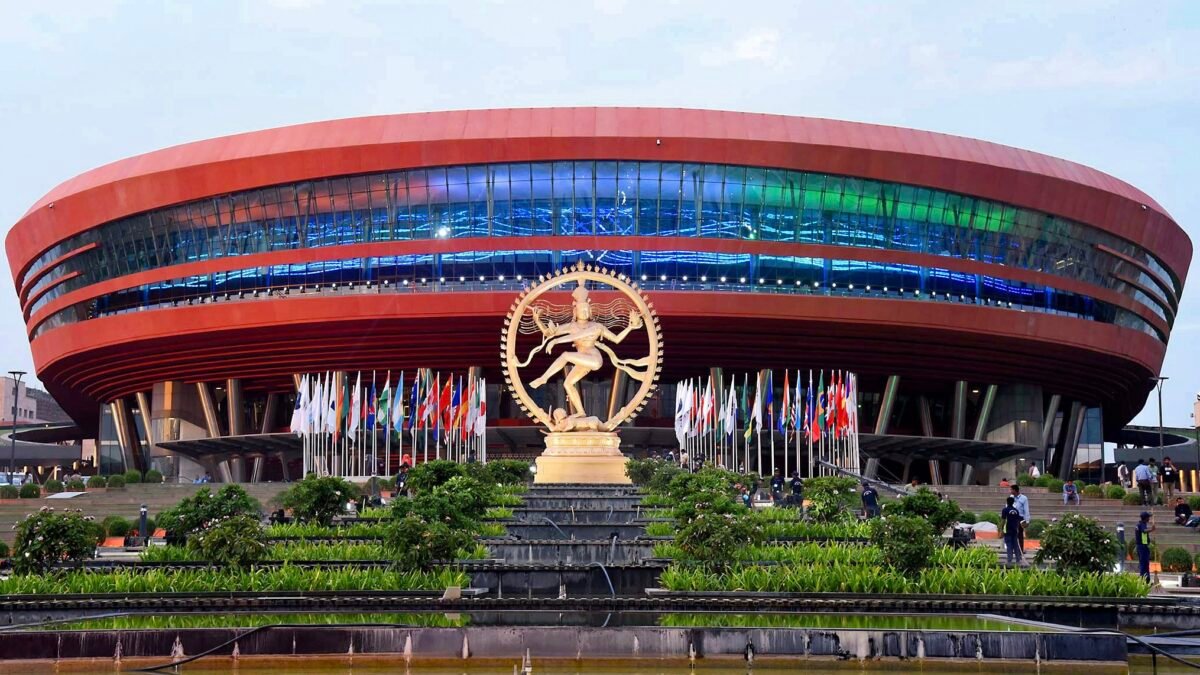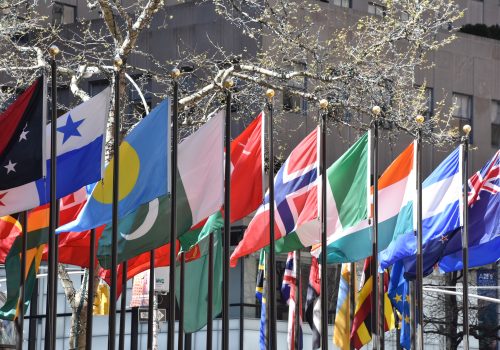September 7, 2023 • 1:31 pm ET
This year’s Group of Twenty (G20) Summit will start on September 9 in New Delhi. Under the theme “One Earth, One Family, One Future,” India has used its G20 presidency to focus discussions at ministerial meetings throughout the year in preparation for the summit. The agenda that has emerged will focus on economic growth, financial stability, and development needs—issues important to countries in the Global South. In particular, Indian Prime Minister Narendra Modi has tried to sidestep the contentious issue of Russia’s war in Ukraine, arguing that, instead, the United Nations (UN) is the proper international organization to discuss this problem, while the G20 should remain a forum for economic and financial coordination.
Modi’s pragmatic approach, however, appears to have been sabotaged by the decisions of Russian President Vladimir Putin and Chinese leader Xi Jinping not to attend the summit in New Delhi—perhaps partly in opposition to the language in the draft communiqué condemning Russia’s war in Ukraine. This has confirmed the divisions within the G20, gradually transforming it from the premier forum for international economic and financial coordination into a venue where the Group of Seven (G7) on the one hand and China and Russia on the other compete for influence. Expectations for this and future G20 summits should be adjusted accordingly. At best, they are likely to yield only small steps forward instead of big breakthroughs.
Against this dismal backdrop, it seems likely that India’s approach could still produce some concrete results at the summit, including outcomes that are beneficial to developing countries. This should be the case whether the results are announced in a joint communiqué, if there is consensus, or in a chairman’s statement summarizing the outcomes, if there isn’t.
So, what might come out of the summit? During the G20 discussions preceding the summit, India has raised several issues important to countries in the Global South. These include the prospect of G20 membership for the African Union (AU), reform of global financial institutions, restructuring of sovereign debt, and additional climate financing. Several of these issues and proposals have not received support from either the G7 or China. Nevertheless, the fact that India has been able to articulate them should reflect well on its efforts to be viewed as the voice of the Global South. Each issue is worth a deeper look to gauge what progress might be possible in New Delhi.
The African Union’s G20 membership
After India assumed the G20 presidency in December, Indian leaders expressed concern that most of the Global South has not been at the G20 table. To promote inclusive growth, India has proposed to invite the AU, which consists of all fifty-five African countries, to join the G20 as a full member—similar to the European Union (EU). This will likely materialize at the summit, especially since US President Joe Biden and German Chancellor Olaf Scholz have expressed their support. The move would represent a concrete step forward in making the G20 more representative of the world and a forum where developing countries can directly raise their concerns. However, the African Union’s membership could raise the issue of whether to invite other regional organizations, such as the Organization of American States and the Association of Southeast Asian Nations, to join as well.
Reforming global financial institutions
Another area that could see progress is the G20’s approach toward multilateral development banks (MDBs). The G20 could, for example, amplify calls for MDBs to incorporate climate change financing into their core missions and increase their lending for such purposes.
Specifically, the G20 could leverage earlier progress to push the MDBs to quickly complete their internal reviews and implement the recommendations put forward by the Independent Group of Experts—mainly contained in the proposed Capital Adequacy Framework, or CAF—to optimize their balance sheets, freeing up room for new loans. These measures include improving accounting for callable capital to serve as guarantees for their loans to lift their capital capacity, as well as leveraging the very good credit quality of their portfolios to reduce their calculated risk-weighted assets to make room for new loans. All together, these reforms could enable the MDBs to lend an estimated eighty billion dollars more per year without jeopardizing their AAA credit ratings. While clearly insufficient to meet the needs of developing countries, this would still be a step in the right direction and should be implemented as soon as possible since there is strong G20 support. The actual capital increase for the MDBs also remains on the agenda—however, there is not widespread support for this idea given current geopolitical divisions, at least not until the CAF reforms are fully implemented.
Leaders at the G20 Summit will probably also discuss whether to call for a positive conclusion of the International Monetary Fund’s (IMF) sixteenth general review of quotas, which is due to be completed by December 23, 2023. The review aims to raise the quota or permanent resources for the IMF and redistribute the voting shares to increase the representation of emerging market and developing countries. Given current geopolitical tensions, any proposal to give China more voting power is unlikely to be agreed to by the West. More concretely, the G20 should once again raise the issue of countries holding onto excess special drawing rights (SDR)—a reserve asset exchangeable for hard currency—after the IMF’s 2021 allocation to fight the global recession. Rich countries had pledged to voluntarily channel SDR 73 billion ($103.4 billion at current exchange rates) to the IMF’s Poverty Reduction and Growth Trust and Resilience and Sustainability Trust, which offer concessional loans to low-income countries. The G20 should renew its push for wealthier countries to meet and exceed their earlier pledges.
Last but not least, developing countries want to see reform of the World Trade Organization (WTO) to give them equitable and rules-based access to world trade. Recently, several developing countries have been unhappy with the EU Carbon Border Adjustment Mechanism, or carbon tax—and India plans to file complaints to the WTO over the tax. More generally, it is difficult to see breakthroughs being made on two contentious issues: restoring the functionality of the WTO’s Appellate Body and dealing with China’s approach to supporting its companies in domestic and global markets. Nevertheless, the demands of developing countries need to remain at the forefront of efforts to reform the WTO going forward.
Sovereign debt restructuring
G20-inspired efforts to improve the sovereign debt restructuring framework recently made some small steps forward. The Global Sovereign Debt Roundtable, co-chaired by the IMF, the World Bank, and the presidency of the G20, was launched during the spring 2023 meetings of the IMF and World Bank in Washington, DC. Bringing together representatives of official bilateral and multilateral creditors, private creditors, and debtor countries, several meetings have been held since the roundtable was launched to discuss technical issues. These issues include the timely sharing of information, improvement of debt transparency, comparability of treatment, and cutoff points in calculating debt to be restructured. In addition, a debt restructuring deal for Zambia covering $6.3 billion with official bilateral creditors was announced in Paris in June—a welcome development, even if the deal was not as good as it could have been and negotiations for final memorandums of understanding are still ongoing.
Going forward, international focus will likely be on substantive matters, such as providing significant debt relief to low-income countries on a timely basis, instead of just on procedural and process issues. Timeliness is especially important, as a dozen highly indebted emerging markets and low-income countries have languished for some time in debt distress. Reportedly, China has objected to the language in the draft communiqué regarding emerging market debt.
Climate financing
The developed countries in the G20 will likely be confronted with calls to live up to their 2009 pledges to transfer one hundred billion dollars a year to help developing countries cope with impacts of climate change. More practically, there will be more discussions of ideas such as debt-for-climate swaps, where creditors agree to substantial sovereign debt relief, an important portion of which will be used by debtor countries for climate change mitigation and transition activities.
India has supported the UN secretary-general’s proposals for a stimulus of five hundred billion dollars to help developing countries meet UN Sustainable Development Goals by 2030. However, the G7 has been lukewarm on the proposal and is unlikely to agree to that demand.
From India to Brazil
The upcoming G20 Summit could also mark an opening salvo in the competition between China and India for the mantle of voice of the Global South. India’s approach is to focus on specific proposals to reform the current international economic and financial system and institutions to better meet the development needs of developing countries.
At the same time, it is worth watching if the BRICS group—originally made up of Brazil, Russia, India, China, and South Africa and soon to expand to six more countries—becomes more of a counterpart to the G7. The axis in the bloc of China, Russia, and Iran (which was just asked to join) poses a potential challenge if it promotes anti-US polemics to further its own agenda and influence, including through the Belt and Road Initiative. Such an approach would make any global compromises required to reform the current economic and financial system more difficult, if not impossible, to achieve.
Hopefully, countries in the Global South can realize this problem and lean toward India’s less confrontational approach. In that context, the West—represented by the G7—should do what it can to tilt the balance in India’s favor in its competition against China to become the voice of the Global South, both this year in New Delhi and next year when the G20 meets in Rio de Janeiro.
Hung Tran is a nonresident senior fellow at the Atlantic Council’s GeoEconomics Center, a former executive managing director at the Institute of International Finance, and a former deputy director at the International Monetary Fund.
Further reading
Thu, Jul 27, 2023
The G20 still hasn’t made a breakthrough on sovereign debt restructuring
Econographics
By
Hung Tran
The G20’s recent meeting failed to make progress on sovereign debt restructuring, disappointing low and middle-income countries. Zambia’s deal favored China’s preferences, revealing the challenges in establishing an equitable framework for debt relief.
Image: A glimpse of Bharat Mandapam in Pragati Maidan ahead of the upcoming G20 Summit, in New Delhi.


